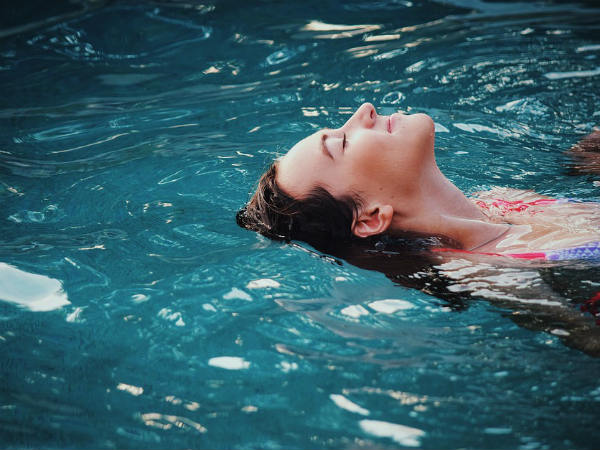
Causes Of Swimmer’s Ear
The ears can protect itself from bacterial growth and can prevent foreign bodies from entering inside the ear. But, if there is prolonged moisture or abrasion in your ear canal, the natural defence mechanisms get impaired, resulting in ear infection.
• Swimmer’s ear is usually caused by bacteria and it’s less commonly caused by fungus or virus. When water gets stuck in your ear canal for a long time after swimming or when you take a shower very often, it can become a breeding ground for bacteria such as Pseudomonas aeruginosa and Staphylococcus aureus [4]. Also swimming in polluted water can also cause swimmer’s ear due to the water contaminated with bacteria. Humidity and perspiration can also lead to ear infection.
• Cleaning the ear with cotton swabs, hair clips, fingers, pencils or any other objects can cause injury to the ear canal [5].
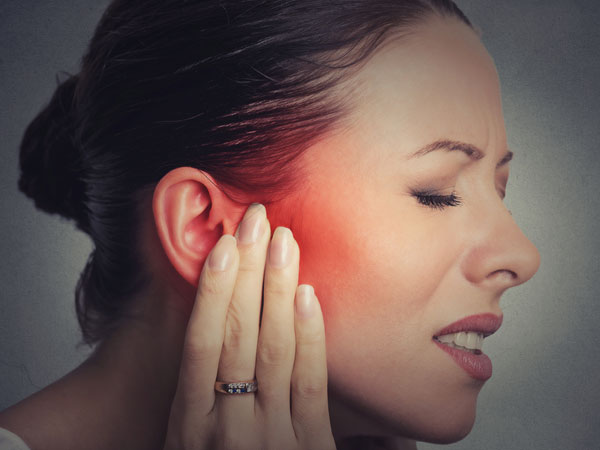
Symptoms Of Swimmer’s Ear
• Itching in the ear canal [6]
• Blocked ear.
• Bad odour or pus oozing out from the ear.
• Redness and swelling in the outer ear.
• Ear pain.
• Temporary hearing loss or reduced hearing
• Fever.
Consult a doctor immediately, if you experience any of the above-mentioned symptoms.
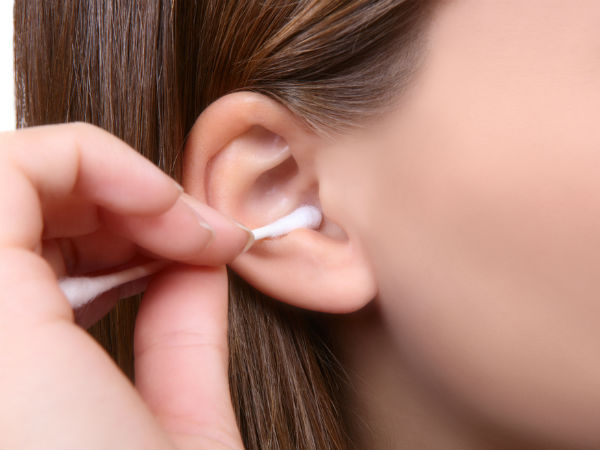
Risk Factors Of Swimmer’s Ear
• Swimming, especially swimming in water contaminated with bacteria.
• Cleaning the ear with cotton tips or any other objects.
• Using hearing aid.
• A foreign body inside the ear.
• Certain dermatological conditions such as eczema and psoriasis.
• Wearing tight head scarves.
• Having an impaired immune system.
• Narrow outer ear canal.
• Humidity.
• Radiotherapy or chemotherapy.
 How To Treat Ear Pain Caused By Common Cold? Home Remedies And Precautions
How To Treat Ear Pain Caused By Common Cold? Home Remedies And Precautions
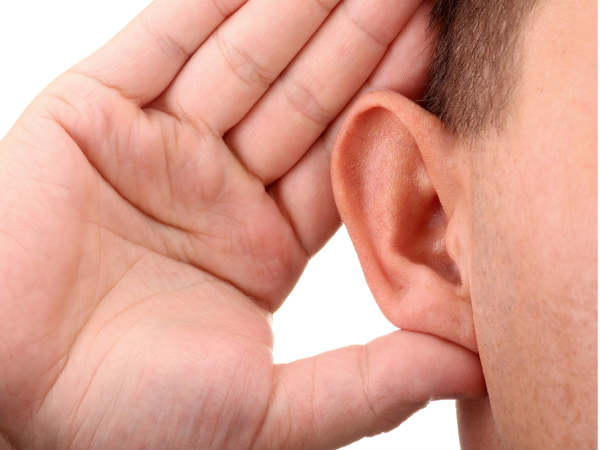
Complications Of Swimmer’s Ear
• Hearing loss
• Malignant otitis externa
READ RELATED: Vitamin B12 deficiency: The five areas on your body that could show symptoms – ‘See a GP’
• Myringitis (inflammation of the tympanic membrane)
• Perichondritis (infection of the skin and tissue that surrounds the cartilage of the outer ear).
• Facial cellulitis (Infection of the face tissues).
• Osteomyelitis of the temporal bone [9].
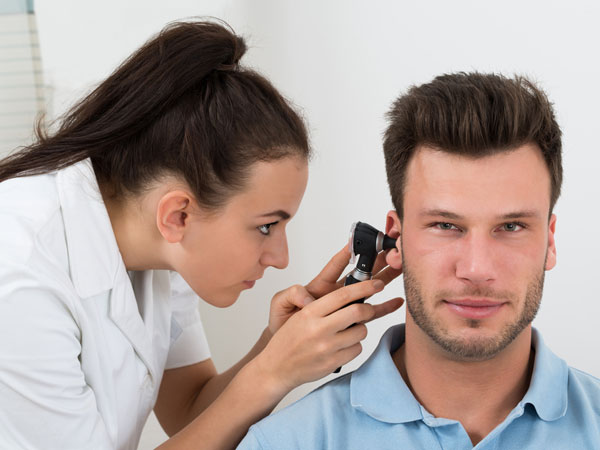
Diagnosis Of Swimmer’s Ear
A physical examination and look into the complete medical history is done for the diagnosis of swimmer’s ear. The doctor will examine your ear and the surrounding skin and lymph nodes. And then the doctor will fully examine your ear with the help of an otoscope, a device used to look into the ears.
Depending on the initial assessment, stage and severity of the disease, the doctor will conduct further testing such as collecting the fluid sample from the ear to check for bacteria.
 What Causes Ear Pimples And How To Treat Them
What Causes Ear Pimples And How To Treat Them
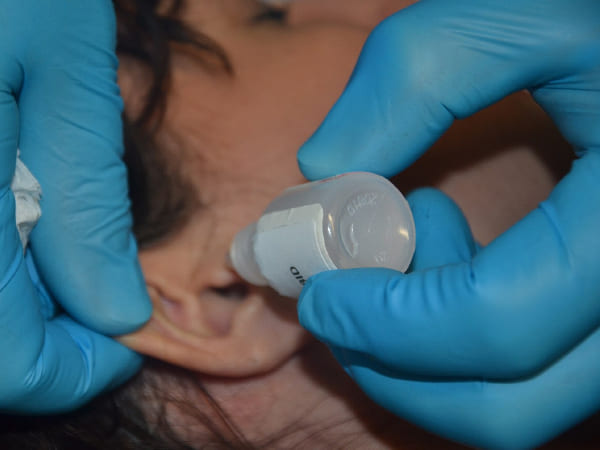
Treatment Of Swimmer’s Ear
• Ear cleaning – Cleaning the outer ear canal from pus, debris or flaky skin with the help of a suction device.
• Antibiotic ear drops – These ear drops can help lower inflammation and secretions and bring relief from ear pain. The antibiotic ear drops such as polymyxin b, hydrocortisone, neomycin and ofloxacin, etc are used for the treatment of swimmer’s ear. With the proper usage of ear drops swimmer’s ear usually goes away within 7 to 10 days.
• Painkillers – Acetaminophen medication for relieving mild to moderate pain.
• Ear wick – It is a soft cotton gauze which is moistened with antibiotic drops and placed in the ear canal. This helps the medicine to enter the ear and decrease the swelling in the ear canal. The ear wick should be removed within two to three days [10].
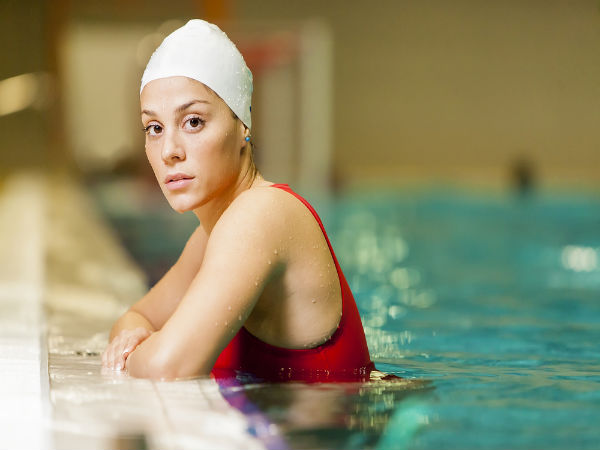
Prevention Of Swimmer’s Ear
• Keep your ears dry by placing a cotton ball or soft ear plugs in the ear and use a shower cap to prevent water from entering the ear.
• Remove water from the ears by shaking your head from side to side.
• Clean your ears under a doctor’s supervision. Don’t clean your ears with sharp objects.
• Dry the ear with a towel after bathing or swimming.
• Don’t swim in polluted water.
Common FAQs
Q. Will swimmer’s ear go away by itself?
A. Outer ear infection may heal on its own, but in severe cases, treatment is necessary.
Q. How long does swimmer’s ear take to cure?
A. If treated with antibiotic ear drops, swimmer’s ear may cure within 7 to 10 days.
Q. What happens if swimmer’s ear goes untreated?
A. If swimmer’s ear is left untreated, it may lead to hearing loss or the infection can spread to nearby tissues.
Q. How can you tell the difference between an ear infection and swimmer’s ear?
A. In swimmer’s ear, you will feel the pain in the outer ear canal whereas, in ear infection, you will experience the pain in the inner ear, near the eardrum.
Source: boldsky blog



 10 Best Essential Oils For Ear Infection
10 Best Essential Oils For Ear Infection





